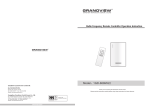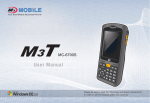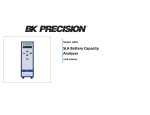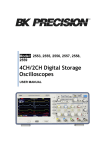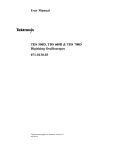Download 969 KB - Test Equipment Depot
Transcript
99 Washington Street Melrose, MA 02176 Phone 781-665-1400 Toll Free 1-800-517-8431 Visit us at www.TestEquipmentDepot.com Model: 600B SLA Battery Capacity Analyzer USER MANUAL Safety Summary The following safety precautions apply to both operating and maintenance personnel and must be followed during all phases of operation, service, and repair of this instrument. Before applying power to this instrument: • Read and understand the safety and operational information in this manual. • Apply all the listed safety precautions. • Verify that the voltage selector at the line power cord input is set to the correct line voltage. Operating the instrument at an incorrect line voltage will void the warranty. • Make all connections to the instrument before applying power. • Do not operate the instrument in ways not specified by this manual or by B&K Precision. Failure to comply with these precautions or with warnings elsewhere in this manual violates the safety standards of design, manufacture, and intended use of the instrument. B&K Precision assumes no liability for a customer’s failure to comply with these requirements. Category rating The IEC 61010 standard defines safety category ratings that specify the amount of electrical energy available and the voltage impulses that may occur on electrical conductors associated with these category ratings. The category rating is a Roman numeral of I, II, III, or IV. This rating is also accompanied 2 by a maximum voltage of the circuit to be tested, which defines the voltage impulses expected and required insulation clearances. These categories are: Category I (CAT I): Measurement instruments whose measurement inputs are not intended to be connected to the mains supply. The voltages in the environment are typically derived from a limited-‐ energy transformer or a battery. Category II (CAT II): Measurement instruments whose measurement inputs are meant to be connected to the mains supply at a standard wall outlet or similar sources. Example measurement environments are portable tools and household appliances. Category III (CAT III): Measurement instruments whose measurement inputs are meant to be connected to the mains installation of a building. Examples are measurements inside a building's circuit breaker panel or the wiring of permanently-‐installed motors. Category IV (CAT IV): Measurement instruments whose measurement inputs are meant to be connected to the primary power entering a building or other outdoor wiring. Do not use this instrument in an electrical environment with a higher category rating than what is specified in this manual for this instrument. 3 You must ensure that each accessory you use with this instrument has a category rating equal to or higher than the instrument's category rating to maintain the instrument's category rating. Failure to do so will lower the category rating of the measuring system. Do not operate in an explosive or flammable atmosphere Do not operate the instrument in the presence of flammable gases or vapors, fumes, or finely-‐divided particulates. The instrument is designed to be used in office-‐type indoor environments. Do not operate the instrument • In the presence of noxious, corrosive, or flammable fumes, gases, vapors, chemicals, or finely-‐ divided particulates. • In relative humidity conditions outside the instrument's specifications. • In environments where there is a danger of any liquid being spilled on the instrument or where any liquid can condense on the instrument. • In air temperatures exceeding the specified operating temperatures. • In atmospheric pressures outside the specified altitude limits or where the surrounding gas is not air. 4 • In environments with restricted cooling air flow, even if the air temperatures are within specifications. • In direct sunlight. This instrument is intended to be used in an indoor pollution degree 2 environment. The operating temperature range is 0 °C to 40 °C and the operating humidity range is ≤ 95% relative humidity with no condensation allowed. Measurements made by this instrument may be outside specifications if the instrument is used in non-‐ office-‐type environments. Such environments may include rapid temperature or humidity changes, sunlight, vibration and/or mechanical shocks, acoustic noise, electrical noise, strong electric fields, or strong magnetic fields. Do not operate instrument if damaged If the instrument is damaged, appears to be damaged, or if any liquid, chemical, or other material gets on or inside the instrument, remove the instrument's power cord, remove the instrument from service, label it as not to be operated, and return the instrument to B&K Precision for repair. Notify B&K Precision of the nature of any contamination of the instrument. Clean the instrument only as instructed 5 Do not clean the instrument, its switches, or its terminals with contact cleaners, abrasives, lubricants, solvents, acids/bases, or other such chemicals. Clean the instrument only with a clean dry lint-‐free cloth or as instructed in this manual. Not for critical applications This instrument is not authorized for use in contact with the human body or for use as a component in a life-‐support device or system. Do not touch live circuits Instrument covers must not be removed by operating personnel. Component replacement and internal adjustments must be made by qualified service-‐trained maintenance personnel who are aware of the hazards involved when the instrument's covers and shields are removed. Under certain conditions, even with the power cord removed, dangerous voltages may exist when the covers are removed. To avoid injuries, always disconnect the power cord from the instrument, disconnect all other connections (for example, test leads, computer interface cables, etc.), discharge all circuits, and verify there are no hazardous voltages present on any conductors by measurements with a properly-‐operating voltage-‐ sensing device before touching any internal parts. Verify the voltage-‐sensing device is working properly before and after making the measurements by testing with known-‐operating voltage sources and test for both DC and AC voltages. Do not attempt any service or adjustment unless another person capable of rendering first aid and resuscitation is present. Do not insert any object into an instrument's ventilation openings or other openings. 6 Servicing Do not substitute parts that are not approved by B&K Precision or modify this instrument. Return the instrument to B&K Precision for service and repair to ensure that safety and performance features are maintained. For continued safe use of the instrument • Do not place heavy objects on the instrument. • Do not obstruct cooling air flow to the instrument. • Do not place a hot soldering iron on the instrument. 7 Table of Contents Section 1 General Description ....................................................................................................................... 9 1.1 INTRODUCTION ................................................................................................................................... 9 1.2 APPLICATIONS ..................................................................................................................................... 9 1.3 SPECIFICATIONS ................................................................................................................................... 9 Section 2 Operation .................................................................................................................................... 10 2.2 OPERATING PROCEDURE ................................................................................................................... 11 Service Information .................................................................................................................................... 13 Limited One-‐Year Warranty ....................................................................................................................... 14 Section 1 General Description 1.1 INTRODUCTION B&K Precision Battery Capacity Analyzer Model 600B measures the % capacity left in a battery. The model 600B supports 12V storage type lead acid batteries with wide range of Ah capacity. No external power (Main or DC) is required. The unit works on BUT (Battery Under Test). 1.2 APPLICATIONS As the information age develops it is likely that the demand for UPS units will increase for use in hospitals, offices, labs etc. It is expected that the importance of battery maintenance will increase along with increasing demand for UPS. The 600B can be applicable for Automobile Service Stations, UPS Manufacturing, Maintenance and Field Servicing, QC Department, Battery Systems in Railways, Telecommunications, Ships / Submarine. 1.3 SPECIFICATIONS TECHNICAL 1) Capacity Display Range: 0 % to 100 % 2) Max. Input Voltage: 20 V 3) No Load Voltage Indication Accuracy: ± 2 counts Caution: Do not exceed max. input voltage rating. Doing so may cause fatal damage to the unit. PHYSICAL 1) Dimensions (WxHxD): 2) Weight: 2.91 x 10.44 x 2.12” (74 x 265.1 x 54 mm) 2.65 lbs. (1.2 Kg.) NOTE: Specifications and information are subject to change without notice. Please visit www.bkprecision.com for the most current product information. 9 Section 2 Operation FRONT PANEL CONTROLS Refer to the Front view of the unit. 1) Ah Range : With this key the user can select the correct Ah range a ccording to the battery under test. 2) Ah Select LED: This LED in ON to indicate that the user can select the Ah range. 3) Ah Setting Saved LED: 4) Display Mode: 5) Battery Voltage: 6) Battery Capacity %: 7) 8) 9) This LED is ON when the u nit locks t o a particular Ah range set b y the user. This key selects the display either as No load voltage o r % balance capacity. Indicates that the Battery voltage is being displayed. This LED is ON when remaining capacity is being displayed. this key. Load Test: The t est starts by p ressing Ready/Complete: When this LED is ON a nd steady, indicates that the unit is ready to conduct a test. Test I n Progress: 10) Reverse P olarity: 11) LED Display 12) +ve Cable 13) –ve Cable 10 3 sec. w hen This LED is ON for approx. is carried out. the b attery test unit is connected in If the t o a battery polarity this LED will be O N. reverse either battery voltage Displays or b attery capacity percent. with strain relief. Positive connecting cable Negative connecting cable with strain relief. 2.2 OPERATING PROCEDURE Follow the steps as outlined b elow: 2.2.2 Selecting A h Capacity Press the 'Ah Range' key. The select LED glows as shown. 2.2.1 Connection Procedure Connect Battery Capacity Analyzer (600B) to Battery Under Test (BUT). Connect the +ve terminal of 600B to +ve terminal of Battery. Connect -‐ve terminal of 600B to -‐ve terminal of Battery. The 600B will be powered by the BUT. On Power up, 600B performs a self test by turning on the 7 segments, LEDs one after another & finally flashing the version number. The display will show the last selected/stored Ah value. (Power ON default value is 7 Ah) To change the value, press the key again. Display shows new value. Keep on p ressing till the desired Ah is obtained. To Lock the Ah capacity, either press any key OTHER than the Ah Range key OR wait for about 10 seconds. Your selected Ah value will automatically get locked and is indicated by the glowing of 'Locked' LED. Caution: Do not connect the +ve terminal of 600B to -‐ve terminal of BUT and -‐ve terminal of 600B to + ve terminal of BUT. By doing so, the ‘Reverse Polarity’ LED glows as shown. 11 2.2.4 Observing Result After a Test By default the Battery Voltage is displayed on the display. To observe the Balance Capacity left, press the ‘Display Mode’ switch. The display will show the capacity in percentage. 2.2.3 Conducting a Test Test can be conducted any time Ready/Complete LED is ON by pressing the “Load Test” key. By doing so the ‘Test On’ LED starts glowing. Typically, it glows for about 2 seconds. Thereafter the ‘Ready’ starts blinking. test (The blinking time depends on the Ah range selected). Thereafter it becomes steady. Note: Balance Capacity can have a meaningful value only after conduction of a test. At power on, a value of 0 is shown. Hence Balance Capacity should be seen only after conduction of a test. To observe No Load Battery Voltage, press the ‘Display Mode Key’. The display will show the No Load Battery Voltage. 1) Do not connect Model 600B to a voltage source more than 20V. Note: User cannot conduct a test while the ‘Ready’ LED is blinking. 2) Do not connect the unit to a battery connected in circuit. 12 Limited One-‐Year Warranty B&K Precision Corp. warrants to the original purchaser that its products and the component parts thereof, will be free from defects in workmanship and materials for a period of one year from date of purchase. B&K Precision Corp. will, without charge, repair or replace, at its option, defective product or component parts. Returned product must be accompanied by proof of the purchase date in the form of a sales receipt. Exclusions: This warranty does not apply in the event of misuse or abuse of the product or as a result of unauthorized alterations or repairs. The warranty is void if the serial number is altered, defaced or removed. B&K Precision Corp. shall not be liable for any consequential damages, including without limitation damages resulting from loss of use. Some states do not allow limitations of incidental or consequential damages. So the above limitation or exclusion may not apply to you. This warranty gives you specific rights and you may have other rights, which vary from state-‐to-‐state. 14 ©2015 B&K Precision Corporation Printed in Taiwan 082615 Test Equipment Depot - 800.517.8431 - 99 Washington Street Melrose, MA 02176 TestEquipmentDepot.com


















